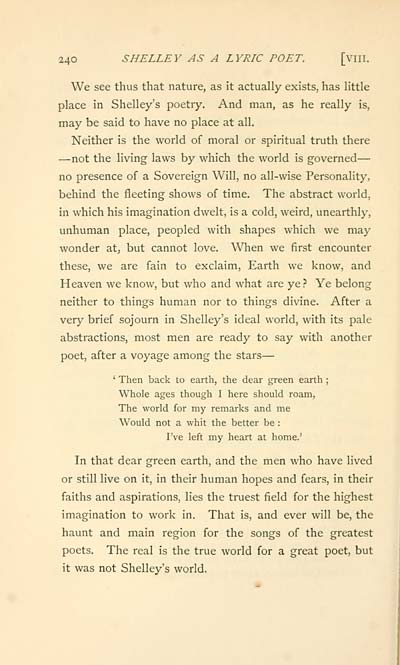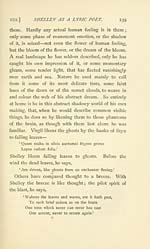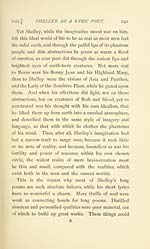Ossian Collection > Aspects of poetry
(256)
Download files
Complete book:
Individual page:
Thumbnail gallery: Grid view | List view

240 SHELLEY AS A LYRIC POET. [vill.
We see thus that nature, as it actually exists, has little
place in Shelley's poetry. And man, as he really is,
may be said to have no place at all.
Neither is the world of moral or spiritual truth there
— not the living laws by which the world is governed —
no presence of a Sovereign Will, no all-wise Personality,
behind the fleeting shows of time. The abstract world,
in which his imagination dwelt, is a cold, weird, unearthly,
unhuman place, peopled with shapes which we may
wonder at^ but cannot love. When we first encounter
these, we are fain to exclaim. Earth we know, and
Heaven we know, but who and what are ye ? Ye belong
neither to things human nor to things divine. After a
very brief sojourn in Shelley's ideal world, with its pale
abstractions, most men are ready to say with another
poet, after a voyage among the stars —
' Then back to earth, the dear green earth ;
Whole ages though I here should roam.
The world for my remarks and me
Would not a whit the better be :
I've left my heart at home.'
In that dear green earth, and the men who have lived
or still live on it, in their human hopes and fears, in their
faiths and aspirations, lies the truest field for the highest
imagination to work in. That is, and ever will be, the
haunt and main region for the songs of the greatest
poets. The real is the true world for a great poet, but
it was not Shelley's world.
We see thus that nature, as it actually exists, has little
place in Shelley's poetry. And man, as he really is,
may be said to have no place at all.
Neither is the world of moral or spiritual truth there
— not the living laws by which the world is governed —
no presence of a Sovereign Will, no all-wise Personality,
behind the fleeting shows of time. The abstract world,
in which his imagination dwelt, is a cold, weird, unearthly,
unhuman place, peopled with shapes which we may
wonder at^ but cannot love. When we first encounter
these, we are fain to exclaim. Earth we know, and
Heaven we know, but who and what are ye ? Ye belong
neither to things human nor to things divine. After a
very brief sojourn in Shelley's ideal world, with its pale
abstractions, most men are ready to say with another
poet, after a voyage among the stars —
' Then back to earth, the dear green earth ;
Whole ages though I here should roam.
The world for my remarks and me
Would not a whit the better be :
I've left my heart at home.'
In that dear green earth, and the men who have lived
or still live on it, in their human hopes and fears, in their
faiths and aspirations, lies the truest field for the highest
imagination to work in. That is, and ever will be, the
haunt and main region for the songs of the greatest
poets. The real is the true world for a great poet, but
it was not Shelley's world.
Set display mode to: Large image | Transcription
Images and transcriptions on this page, including medium image downloads, may be used under the Creative Commons Attribution 4.0 International Licence unless otherwise stated. ![]()
| Early Gaelic Book Collections > Ossian Collection > Aspects of poetry > (256) |
|---|
| Permanent URL | https://digital.nls.uk/78388344 |
|---|
| Description | Selected books from the Ossian Collection of 327 volumes, originally assembled by J. Norman Methven of Perth. Different editions and translations of James MacPherson's epic poem 'Ossian', some with a map of the 'Kingdom of Connor'. Also secondary material relating to Ossianic poetry and the Ossian controversy. |
|---|
| Description | Selected items from five 'Special and Named Printed Collections'. Includes books in Gaelic and other Celtic languages, works about the Gaels, their languages, literature, culture and history. |
|---|

